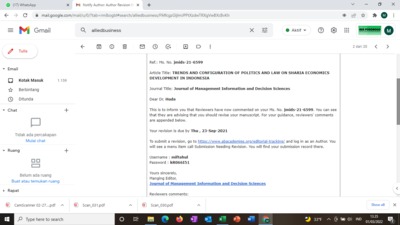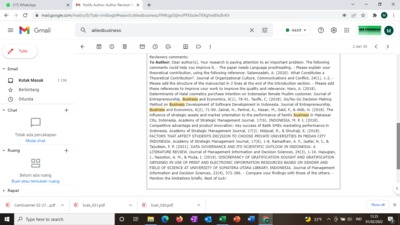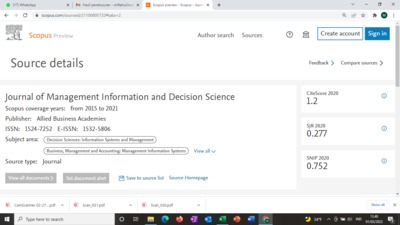Huda, Miftahul and Santoso, Lukman and Purnomo, Agus and Aminuddin, Luthfi Hadi (2021) Trends and Configuration of Politics and Law on Sharia Economics Development in Indonesia. Journal of Management Information and Decision Sciences, 24 (1). pp. 1-9. ISSN 1524-7252 , E-ISSN: 1532-5806
![[img]](http://repository.iainponorogo.ac.id/906/1.hassmallThumbnailVersion/Bukti%20Korepondensi_1.png)
|
Image
Bukti Korepondensi_1.png Download (167kB) | Preview |
|
![[img]](http://repository.iainponorogo.ac.id/906/2.hassmallThumbnailVersion/Bukti%20Korepondensi_2.png)
|
Image
Bukti Korepondensi_2.png Download (177kB) | Preview |
|
![[img]](http://repository.iainponorogo.ac.id/906/3.hassmallThumbnailVersion/Bukti%20Korepondensi_3.png)
|
Image
Bukti Korepondensi_3.png Download (164kB) | Preview |
|
![[img]](http://repository.iainponorogo.ac.id/906/4.hassmallThumbnailVersion/Bukti%20Korepondensi_4.png)
|
Image
Bukti Korepondensi_4.png Download (149kB) | Preview |
|
![[img]](http://repository.iainponorogo.ac.id/906/5.hassmallThumbnailVersion/Bukti%20Korespondensi_5.png)
|
Image
Bukti Korespondensi_5.png Download (192kB) | Preview |
|
![[img]](http://repository.iainponorogo.ac.id/906/6.hassmallThumbnailVersion/Jurnal%20dalam%20indexing%20Scopus.png)
|
Image
Jurnal dalam indexing Scopus.png Download (162kB) | Preview |
|
|
Text
Peer Review OK_Prof Aksin_trends and Configuration.pdf Download (708kB) | Preview |
|
|
Text
Peer Review OK_Prof Kasdi_Trends and Configartion.pdf Download (332kB) | Preview |
|
|
Text
trends-and-configuration-of-politics-and-law-on-sharia-economics-development-in-indonesia.pdf Download (266kB) | Preview |
Abstract
In a legal state entity, politics and law are always intertwined. The presence of the law
cannot be separated from the intervention of political policyholders. Meanwhile, on the other
hand, the political actors' movements must comply with the laws that have been made. However,
legal products as political products are ideally a representation of the aspirations of the people
and at the same time can have an impact on the benefit of the people at large. This study aims to
explore the trends and configurations of Islamic politics and economic law after reform in
Indonesia. This study employed a conceptual- juridical approach and is a type of qualitative
research. Data collection techniques were carried out by digging library sources that are
relevant to the topic of study. This study found that the trend and configuration of politics and
law in the field of Islamic economics in post-reform Indonesia is largely determined by the
internal socio-cultural dynamics of Muslims on the one hand, Islamic-leaning political parties in
parliament, as well as fluctuations in the relationship between Muslims and the state. A
conducive political climate allows the development of the Islamic economic industry joints at the
regional and national levels. This dynamic contributes to the process of strengthening Sharia
economic values in the legislative process and bureaucratization of Sharia economic law in the
national legal arena.
| Item Type: | Journal Article |
|---|---|
| Keyword: | Configuration, Legal Policy (LP), Sharia Economics (SE), Indonesia |
| Subjects: | 14 ECONOMICS > 1499 Other Economics > 149999 Economics not elsewhere classified |
| Depositing User: | Dwi Eliana Sari |
| Date Deposited: | 01 Mar 2022 07:09 |
| Last Modified: | 01 Mar 2022 07:11 |
Actions (login required)
 |
View Item |







